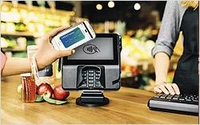
Consumers are still not sold on the value of mobile transactions, despite ever-increasing options available (such as the national
launch last week of Isis Mobile Wallet, backed by AT&T, T-Mobile and Verizon Wireless) and more hands-on experience using them.
According to a Harris Poll of more than
2,500 adults surveyed online, many Americans expect tap-to-pay smartphone payments eventually replacing payment card (64%) and cash (59%) transactions, but not anytime soon. According to the poll,
only 29% of Americans believe tap-to-pay will replace payment card transactions in five years, and only a quarter (26%) expect them to replace cash in that timeframe. (In fact, a growing number of
smartphone users said tap-to-pay transactions will never replace payment cards or cash transactions, according to the poll.)
advertisement
advertisement
These results come as more Americans have had
first-hand experience with mobile transactions (either by doing it themselves or seeing it done). Nearly a third of all Americans (32%) have swiped their payment card through a smartphone attachment,
and 17% have tapped their phone against a special receiver at the cash register.
Still, most Americans lack a compelling motivation to use a smartphone to process payments.
More than half of all Americans (53%) said they didn’t see a reason to switch from cash or payment cards. About a quarter of Americans (24%), however, said being able to use their existing
credit card reward programs on mobile payment platforms would make them more interested, though that number is down from 28% who said the same in 2012.
Using a “mobile
wallet,” which stores all identification, loyalty program cards and other documentation experienced similar interest drops, with 26% of Americans saying it would make them more interested in
mobile payments (down from 30% in 2012).
Security concerns were also an issue. More than half (53%) of consumers said they were concerned about storing sensitive information
on their phones, and 47% said they didn’t want to transmit this information to a seller’s device.
“Dwindling interest since last year may be an
indication that the initial interest has fallen short with practical use, and has not yet been followed up by a constructive call to action by manufacturers and retailers,” said Aaron Kane,
senior research director at Harris Interactive, in a statement. “Right now, the bottom line is that consumers don't yet feel as if they're being presented with a compelling enough reason to
switch their payment habits, nor are they confident that these new methods are secure. This knowledge 'gap' represents an opportunity for companies to change the conversation by addressing these
issues head-on.”